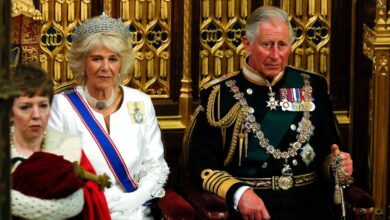Why do oversharers like Prince Harry insist on telling us everything?

My foreskin is too tight,” a friend once shared to the group in the pub. “And every time I try to have sex it’s just extremely awkward.”
On the face of it, there is nothing funny about this – but people laughed anyway. Perhaps because it’s a curveball to hear something so vulnerable – tragicomic, even – and far beyond the humdrum register of normal pub conversation. The laughter wasn’t a dismissal; our friend was heard sympathetically. But the problem had to be treated with levity first. For some reason, it would have been far worse if nobody had acknowledged that.
The memory of my friend’s problem (now happily resolved) was brought into sharp relief this week by Prince Harry’s disclosures in his memoir Spare, which have been described by many as “oversharing”. The most criticised passages include the revelation that he killed 25 men during his second tour in Afghanistan, descriptions of private conversations with close family members, and the declaration that he was suffering from a frostbitten “todger” at his brother’s wedding.
For Harry, this seems to be a rebellion against a lifetime of silence – with a therapeutic purpose.
“I know from my own healing journey that silence has been the least effective remedy,” he told US magazine People this week, justifying his decision to reveal that he had killed 25 fighters. “Expressing and detailing my experience is how I chose to deal with it, in the hopes it would help others.”
“There’s truly no right or wrong way to try and navigate these feelings,” he added.
Harry is right to suggest that that there is no objective measure of what is or isn’t appropriate to share. It’s all about context, according to Dr Tara Quinn-Cirillo, a chartered psychologist with the British Psychological Society. “If someone came to me and said they had been told they are oversharing, I would ask: what’s your baseline? Do you overshare with family and friends? Do you do it at work? What’s made you do it now if it’s new?”
A judgement of “oversharing” is typically informed by the person making it, their relationship with the possible oversharer, and wider social norms. It can be an accusation that’s made maliciously, in order to humiliate or shame someone. But it can also be an indication that something is off.
“As a psychologist, we try and find out the function of their behaviour. What is it they want to do by sharing this information?” says Dr Quinn-Cirillo, who prefers to avoid using the term “oversharing” altogether.
The range of motivations can be very large. Conditions such as personality disorders or autism spectrum disorder can affect people’s inclination to share, or their understanding of what is appropriate to share. In the case of someone with a book to sell – or an article to write – there can be commercial incentives.
And in some cases, what appear to be embarrassing overshares may conceal narcissistic motives. There are lots of names for this online – expressions like “humblebrag” allude to the hidden status-related motives that lie behind superficially damaging public statements. A closer look at Harry’s anecdote about his “frostbitten penis”, for example, reveals that he is actually talking about something that happened on a 200-mile Arctic charity walk – a gentle boast, perhaps.
“Every human behaviour will have a function,” says Dr Quinn-Cirillo. “But sometimes you’ve just got to dig around to find it.”
In the case of Harry, the accusation of oversharing seems to stem from the belief that he has gone above and beyond score-settling into lurid reporting of conversations that should have remained private. The revelation of the then Prince Charles’s plea to his sons at his father’s funeral to not make his “final years a misery” was considered a particularly grave overstep by some commentators.
“People tend to see oversharing in media articles in a negative way,” says Dr Quinn-Cirillo. “But actually, the ulterior motive can be the feeling that we have been misrepresented, so a person might feel the need to step outside of their normal boundaries of sharing, and share a bit more, in order to get their point across.”
But not all disclosures have clear motives. Those embarrassed or annoyed by a friend’s oversharing should be careful about second-guessing their intentions or stigmatising their behaviour, according to Dr Kirren Schnack, a clinical psychologist.
Harry and William, before the major tension, in 2018
“In my experience, most people overshare information because it brings their problems out into the open,” says Dr Schnack. “So the issues that have been unrecognised, and the trauma that is unprocessed. And often people do it because this stuff is unresolved, unprocessed, it’s not been acknowledged, nobody has validated what’s happened.”
Not everybody knows what to do when people share details of trauma – and that, in turn, can isolate the person doing the sharing.
“The more out-there or crazy the content of what you’re sharing, the more you are likely to be stigmatised,” says Dr Schnack. “But the level of detail that is being shared is likely indicative of the level of suffering that the person has gone through or is still stuck with.” The problem is that “socially, this is not acceptable, because people don’t know what to do with it”.
Sharing can be a compulsion born out of suffering. This kind of behaviour is sometimes interpreted as attention seeking – but that is a misunderstanding of its function, according to Dr Schnack.
Prince Harry during a US TV interview with Anderson Cooper this week





